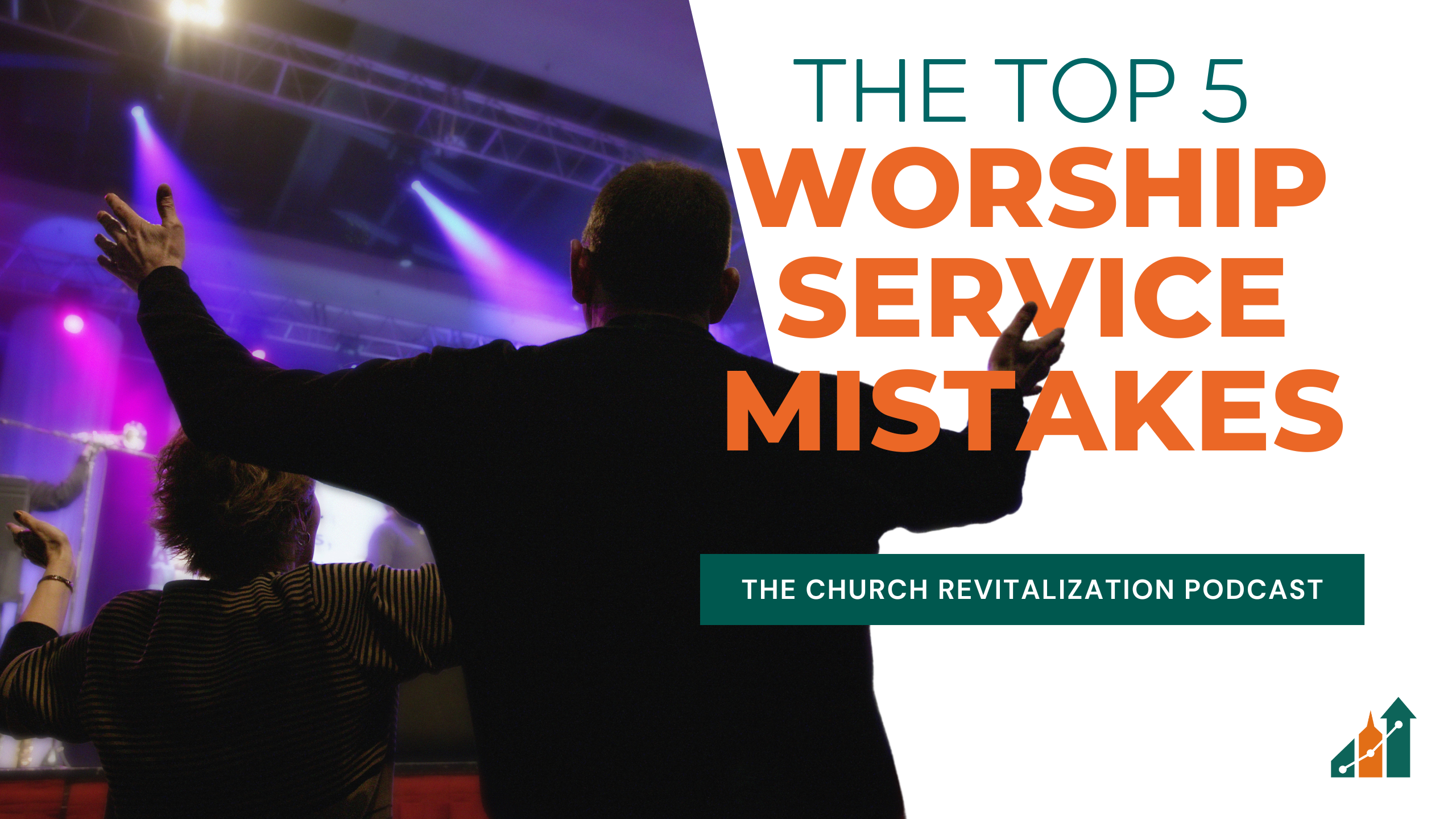The Church Revitalization Podcast – Episode 143
The purpose of your worship service is to lead people to live in awe and obedience to God. You don’t need to be cool, or have the most innovative worship service in your town. Your worship service should lead people to be in awe of God–meaning that they are able to glimpse His greatness and power. It should also lead people to live in obedience to God; they hear His Word preached in a way that leads to transformational living.
In light of these two aims: awe and obedience, it’s worth diagnosing why so many churches have worship services that are declining and failing to accomplish their purpose. In this article, we outline five of the most common worship service mistakes.
However, before detailing these five worship service mistakes, it’s important to highlight a philosophical roadblock for many churches. Many churches falsely assume that to work hard at eliminating worship service mistakes, that the congregation would become “worldly” and the Sunday service would become a “show” rather than a meaningful assembly. While it’s true that some modern churches are too focused on the show, it’s patently false that a pursuit of intentional excellence in worship is somehow a distraction from Godliness.
Entire sections of Exodus and Leviticus are dedicated to explaining how to worship God with excellence and in an orderly way. God takes it so seriously that Aaron’s sons are killed for violating the liturgy God outlined. While our liturgies today (even in the most traditional churches) aren’t reflective of the instructions in Leviticus, the broader point that God is making–that our worship should be sincere, intentional, excellent, and from the heart–has not expired with the Cross.
Therefore, every church, regardless of tradition, style, or liturgy can work hard to eliminate these top five worship service mistakes. In so doing, our worship is more excellent for the Lord and our people are led to live in awe and obedience to God.
Subscribe below to never miss an episode.
[podcast_subscribe id=”8838″]
Mistake Number One: Announcements
Every church makes announcements on Sunday morning. It’s a necessary component, even if it isn’t the most worshipful aspect of the service. The biggest mistake when it comes to announcements is that there are often too many announcements. There’s a false belief that if we announce everything, then people will hear them and not complain that they “didn’t know” about an upcoming event. Ironically, the more we announce, the less people will hear. Therefore, it’s critical to limit the number of announcements, and consider the primary audience for those announcements.
As a best practice, guests and newcomers (people who have attended less than six months), should be your primary audience with announcements. Regular attenders have other modes of communication with you: emails, text messages, newsletters, etc. A guest may only have this one opportunity to hear from you. Therefore, they should be the group you focus on most, and the announcements you share from the stage should be most relevant to them.
Which announcements would you most like a guest to hear and respond to? This will vary from church to church, but often include things like a newcomer lunch, the launch of small groups or classes, new member classes, and opportunities for people to make relational connections with the church.
Be sure that as you announce these things that you avoid insider language. For example, don’t say, “If you have questions about the upcoming Financial Peace class, just ask Steve.” A guest doesn’t know who Steve is. Instead, say something like, “Registration for Financial Peace is at the Connection Desk in the back. The group leader, Steve, will be at the desk to answer any questions you may have.” See the difference? In both instances we mention Steve as the contact person, but in the latter example, a guest receives clear instructions on where to go, why they should talk to Steve, and how to sign up.
Getting the announcement time to work for you takes intentionality, and requires training up the leader or volunteer who is sharing the announcements. This mistake is common, but easy to avoid.
Mistake Number Two: Unclear Call to Action
One of the most common complaints we hear from churches we work with is that they have a hard time connecting with guests. To diagnose the problem, I’ll ask a series of questions like:
- Where are the Connect Cards?
- Are you sure that the pew pens and pencils are there and working?
- What is a guest supposed to do with the Connect Card?
- Where do the Connect Cards go after the service?
- When and how often do you ask guests to complete a Connect Card during the service?
This is before we even speak about a proper guest follow-up process. I mainly want to know if we are collecting guest information properly in the first place. Usually a church winces at a few of these questions, because they realize that they haven’t thought them all through.
Most commonly, churches fail on the last question. Most churches (if they mention a Connect Card at all) will encourage guests to fill it out during their announcements towards the beginning of the service. They may or may not give clear instructions on what to do with that card, and where to put it. But mentioning the Connect Card only once during the service is a mistake.
First, guests are often late to the service. Therefore, if you mention it only at the beginning, there’s a good chance that they missed it. Repeat the call to action at the beginning, middle, and end of the service. During welcome or announcements is great, but also mention it before the offering time. Mention it at the end of the service before closing.
Finally, as a bonus note, be sure you pay attention to children’s check in. Guests may not fill out a Connect Card (no matter how many times you mention it in the service). But if you have a children’s check-in process and the guest has kids, you’ve got their information. Treat new family check-in’s the same as you would a Connect Card, and follow up with them that way.
Mistake Number Three: Awkward and Clunky Transitions
The focus should be on Jesus. As mentioned in the introduction, the aim of the worship service is to lead people to live in awe and obedience to God. But poor transitions lead to distractions.
When transitions between music and other elements are clunky or awkward, our focus is on who is on stage, not Jesus. Talk through your transitions beforehand. Spend time coordinating between the worship team or choir and the pastor, service host, or others involved in the service.
The worship director must spend time each week managing the transitions between songs. If moving from a fast-paced song to a slower song, how will you make that transition without it being distracting? Even things like key changes can be disorienting if not managed well. The goal is not to be “polished and professional” to create a better show; the goal is to minimize distractions so the focus can stay on Jesus.
Mistake Number Four: Distracting Environment
God cared (a lot) about the physical environment as it relates to worship. While we have flexibility and freedom in Christ to shape the physical space today, it is still important. Human beings react to their environment, causing a response towards or away from worship. Ensure that your physical environment leads people to feel the way you want them to feel.
What’s the lighting like in the room? You don’t need fancy moving lights or smoke. But are harsh fluorescent lights distracting from worship? Is it too dark to read your Bible during the sermon?
Is your facility clean? Are there stains on the carpet and ceiling tiles? Is the church musty? Is the stage clean and organized, or are there cables strewn about haphazardly?
Does walking into your church feel like stepping into a museum from the 1860’s… or the 1960’s? Does the decor distract in a way that makes people feel uncomfortable and self-aware, rather than focused on Jesus and worshiping him?
Are there ways that we could incorporate meaningful and worshipful symbolism into our environment? This is a mistake many contemporary churches make. By stripping away all the symbols and creating a blank slate look, it takes away from an opportunity to use art and beauty to point people to Jesus. Tastefully and intentionally find ways to use art and symbols that empower people to think of heavenly things.
Mistake Number Five: Lack of Preparation
This is the biggest worship service mistake: lack of preparation. The band has not rehearsed enough, the sermon has not been practiced or well-written. There is often a distinct lack of planning or coordination between the speaker and the musical elements of worship. A lack of preparation not only leads to guests not returning, it dishonors the Lord.
Circling back to the introduction, there is a sense in some traditional churches that a dedication to a well-rehearsed, well-prepared, well-produced worship service is worldly and not godly. I would contend that the opposite is true.
A well-produced worship service simply means that all of the elements of worship are designed with intentionality and executed with excellence. Are the transitions tight? Does the worship team play the music properly? Does the AV team get the lyrics on the screen on-time, without typos? Do the sermon points integrate with the song selection?
Excellence is the byproduct of preparation. Ironically, when a worship service is executed poorly, it draws more attention to those on stage than if it were executed with excellence. A poorly prepared worship service is a show–just not the kind you would be proud of. It’s distracting, counterproductive, and I believe it dishonors God.
The Lord is not judging our worship services based on the technology we use, the professional-level musicians who are participating, or the oratory genius of the pastor. Jesus said Himself that He is looking for those who will worship in spirit and in truth. The reality is that God cares about our hearts.
At the end of the day, if our hearts are dedicated to worshiping Jesus with excellence, we will avoid many of these common mistakes. Don’t make things too complicated. Lead people into worship with intentionality and excellence, and the Lord will draw people to live in awe and obedience to Him.
BONUS: Watch this episode on YouTube.

Scott Ball is the Vice President and a Lead Guide with The Malphurs Group. He lives in East Tennessee with his wife and two children. (Email Scott).


